高级英语下翻译英汉对照
- 格式:doc
- 大小:150.50 KB
- 文档页数:10
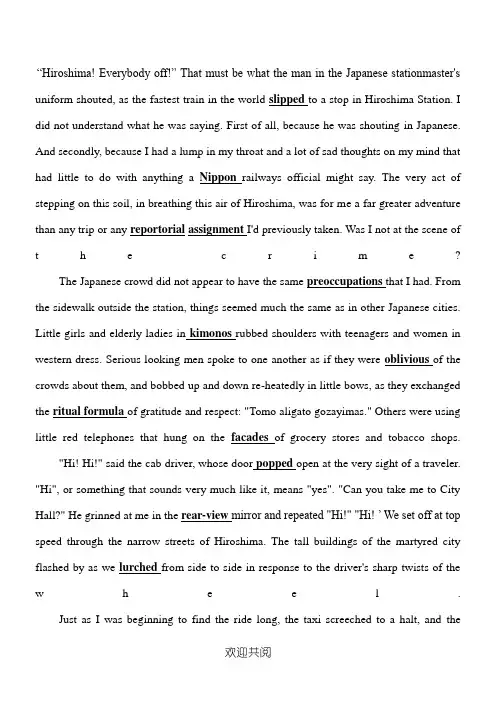
“Hiroshima! Everybody off!” That must be what the man in the Japanese stationmaster's uniform shouted, as the fastest train in the world slipped to a stop in Hiroshima Station. I did not understand what he was saying. First of all, because he was shouting in Japanese. And secondly, because I had a lump in my throat and a lot of sad thoughts on my mind that had little to do with anything a Nippon railways official might say. The very act oft?Hall?" He grinned at me in the rear-view mirror and repeated "Hi!" "Hi! ’ We set off at top speed through the narrow streets of Hiroshima. The tall buildings of the martyred city flashed by as we lurched from side to side in response to the driver's sharp twists of the w h e e l.Just as I was beginning to find the ride long, the taxi screeched to a halt, and thedriver got out and went over to a policeman to ask the way. As in Tokyo, taxi drivers in Hiroshima often know little of their city, but to avoid loss of face before foreigners, will not admit their ignorance, and will accept any destination without concern for how long it m a y t a k e t h e m t o f i n d i t.At last this intermezzo came to an end, and I found myself in front of the gigantic City Hall. The usher bowed deeply and heaved aboats when land becomes tooadrift adrift amid beigek i r t.woman in traditionalone of the low-ceilinged rooms of the little floating house, treading cautiously on the soft matting and experiencing a twinge of embarrassment at the prospect of meeting the mayor of H i r o s h i m a i n m y s o c k s.He was a tall, thin man, sad-eyed and serious. Quite unexpectedly, the strange emotion which had overwhelmed me at the station returned, and I was again crushed bythe thought that I now stood on the site of the first atomic bombardment, where thousands upon thousands of people had been slain in one second, where thousands upon t h o u s a n d s o f o t h e r s h a d l i n g e r e d o n t o d i e i n s l o w a g o n y.The introductions were made. Most of the guests were Japanese, and it was difficult for me to ask them just why we were gathered here. The few Americans and Germans seemed just as inhibited as I was. "Gentlemen," said the mayor, "I am happy to welcome y o u t o H i r o s."Everyone bowed, including the Westerners. After spinal c o l l e.more serious each time the n a r e p e a t e d.continued the mayor.more and more agitated.you world for its--- oysters".I the meaning of these last w o r d j o l t i n g m m y s a d r e v e r i e."Hiroshima –oysters? What about the bomb and the misery and humanity's most heinous crime?" While the mayor went on with his speech in praise of southern Japanese sea food, I cautiously backed away and headed toward the far side of the room, where a few men were talking among themselves and paying little attention to the mayor's speech. "You look puzzled," said a small Japanese man with very large eye-glasses."Well, I must confess that I did not expect a speech about oysters here. I thought that H i r o s h i m a s t i l l f e l t t h e i m p a c t o f t h e a t o m i c i m p a c t.""No one talks about it any more, and no one wants to, especially, the people who were born here or who lived through it. "Do you feel the same way, too?""I was here, but I was not in the center of town. I tell you this because I am almost an"I am a fisherman by trade. I have been here a very long time, more than twenty years, "said an old man in Japanese pajamas. “Wh at is wrong with you?”"Something inside. I was in Hiroshima when it happened. I saw the fire ball. But I had no burns on my face or body. I ran all over the city looking for missing friends and relatives. I thought somehow I had been spared. But later my hair began to fall out, and mybelly turned to water. I felt sick, and ever since then they have been testing and treating me. " The doctor at my side explained and commented upon the old man's story, "We still hare a handful of patients here who are being kept alive by constant car e. The other s died as a r e s u l t o f t h e i r i n j u r i e s,o r e l s e c o m m i t t e d s u i c i d e.""W h y d i d t h e y c o m m i t s u i c i d e?""It is humiliating to survive in this city. If you bear any visiblefromi n t o t's t h a t?"I a s k e d.to improve my character."pieces a small notebook withJapan? I never asked it. But I could read the answer in every eye. “广岛到了!大家请下车!”当世界上最快的高速列车减速驶进广岛车站并渐渐停稳时,那位身着日本火车站站长制服的男人口中喊出的一定是这样的话。
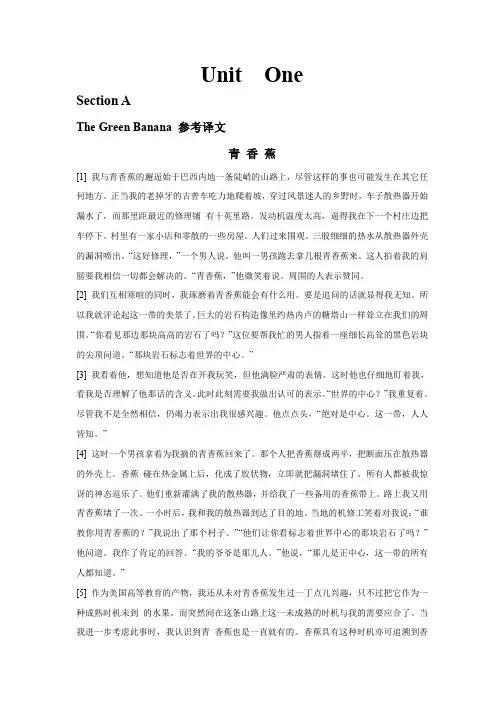
Unit OneSection AThe Green Banana 参考译文青香蕉[1] 我与青香蕉的邂逅始于巴西内地一条陡峭的山路上,尽管这样的事也可能发生在其它任何地方。
正当我的老掉牙的吉普车吃力地爬着坡,穿过风景迷人的乡野时,车子散热器开始漏水了,而那里距最近的修理铺有十英里路。
发动机温度太高,逼得我在下一个村庄边把车停下。
村里有一家小店和零散的一些房屋。
人们过来围观。
三股细细的热水从散热器外壳的漏洞喷出。
“这好修理,”一个男人说。
他叫一男孩跑去拿几根青香蕉来。
这人拍着我的肩膀要我相信一切都会解决的。
“青香蕉,”他微笑着说。
周围的人表示赞同。
[2] 我们互相寒暄的同时,我琢磨着青香蕉能会有什么用。
要是追问的话就显得我无知。
所以我就评论起这一带的美景了。
巨大的岩石构造像里约热内卢的糖塔山一样耸立在我们的周围。
“你看见那边那块高高的岩石了吗?”这位要帮我忙的男人指着一座细长高耸的黑色岩块的尖顶问道。
“那块岩石标志着世界的中心。
”[3] 我看着他,想知道他是否在开我玩笑,但他满脸严肃的表情。
这时他也仔细地盯着我,看我是否理解了他那话的含义。
此时此刻需要我做出认可的表示。
“世界的中心?”我重复着。
尽管我不是全然相信,仍竭力表示出我很感兴趣。
他点点头,“绝对是中心。
这一带,人人皆知。
”[4] 这时一个男孩拿着为我摘的青香蕉回来了。
那个人把香蕉掰成两半,把断面压在散热器的外壳上。
香蕉碰在热金属上后,化成了胶状物,立即就把漏洞堵住了。
所有人都被我惊讶的神态逗乐了。
他们重新灌满了我的散热器,并给我了一些备用的香蕉带上。
路上我又用青香蕉堵了一次。
一小时后,我和我的散热器到达了目的地。
当地的机修工笑着对我说:“谁教你用青香蕉的?”我说出了那个村子。
”“他们让你看标志着世界中心的那块岩石了吗?”他问道。
我作了肯定的回答。
“我的爷爷是那儿人。
”他说,“那儿是正中心,这一带的所有人都知道。
”[5] 作为美国高等教育的产物,我还从未对青香蕉发生过一丁点儿兴趣,只不过把它作为一种成熟时机未到的水果。
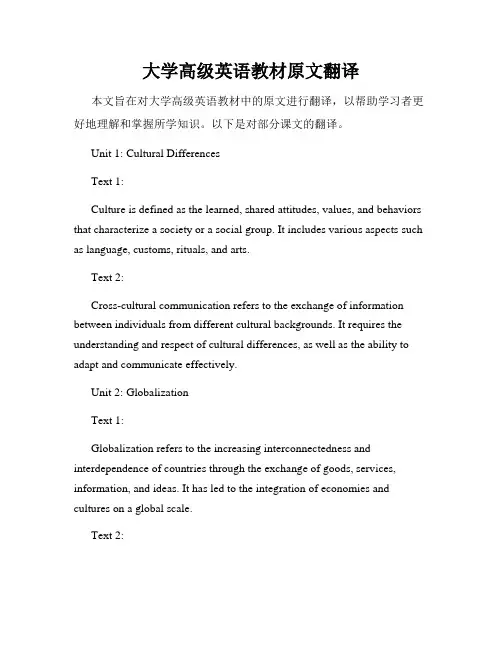
大学高级英语教材原文翻译本文旨在对大学高级英语教材中的原文进行翻译,以帮助学习者更好地理解和掌握所学知识。
以下是对部分课文的翻译。
Unit 1: Cultural DifferencesText 1:Culture is defined as the learned, shared attitudes, values, and behaviors that characterize a society or a social group. It includes various aspects such as language, customs, rituals, and arts.Text 2:Cross-cultural communication refers to the exchange of information between individuals from different cultural backgrounds. It requires the understanding and respect of cultural differences, as well as the ability to adapt and communicate effectively.Unit 2: GlobalizationText 1:Globalization refers to the increasing interconnectedness and interdependence of countries through the exchange of goods, services, information, and ideas. It has led to the integration of economies and cultures on a global scale.Text 2:The advantages of globalization include increased economic growth, improved standards of living, and access to a wider range of goods and services. However, it also brings challenges such as income inequality and cultural homogenization.Unit 3: Environmental IssuesText 1:Environmental issues are concerns that arise from the impact of human activities on the natural world. They include pollution, deforestation, climate change, and loss of biodiversity.Text 2:Sustainable development aims to meet the needs of the present generation without compromising the ability of future generations to meet their own needs. It involves the responsible use of resources and the protection of the environment.Unit 4: Technology and SocietyText 1:Technology plays a crucial role in shaping society and influencing various aspects of our lives. It has revolutionized communication, transportation, and the way we obtain and share information.Text 2:The ethical implications of technological advancements need to be carefully considered. Issues such as privacy, security, and the impact onemployment need to be addressed to ensure that technology benefits society as a whole.以上是部分大学高级英语教材中的课文翻译,希望能够对学习者加深理解和掌握有所帮助。
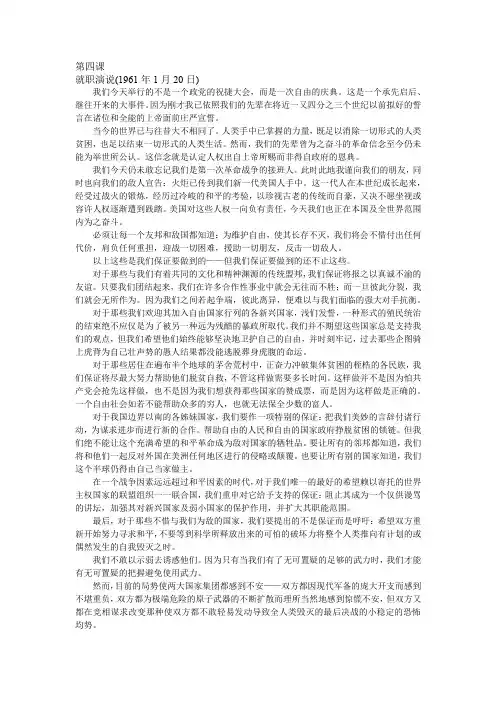
第四课就职演说(1961年1月20日)我们今天举行的不是一个政党的祝捷大会,而是一次自由的庆典。
这是一个承先启后、继往开来的大事件。
因为刚才我已依照我们的先辈在将近一又四分之三个世纪以前拟好的誓言在诸位和全能的上帝面前庄严宣誓。
当今的世界已与往昔大不相同了。
人类手中已掌握的力量,既足以消除一切形式的人类贫困,也足以结束一切形式的人类生活。
然而,我们的先辈曾为之奋斗的革命信念至今仍未能为举世所公认。
这信念就是认定人权出自上帝所赐而非得自政府的恩典。
我们今天仍未敢忘记我们是第一次革命战争的接班人。
此时此地我谨向我们的朋友,同时也向我们的敌人宣告:火炬已传到我们新一代美国人手中。
这一代人在本世纪成长起来,经受过战火的锻炼,经历过冷峻的和平的考验,以珍视古老的传统而自豪,又决不愿坐视或容许人权逐渐遭到践踏。
美国对这些人权一向负有责任,今天我们也正在本国及全世界范围内为之奋斗。
必须让每一个友邦和敌国都知道:为维护自由,使其长存不灭,我们将会不惜付出任何代价,肩负任何重担,迎战一切困难,援助一切朋友,反击一切敌人。
以上这些是我们保证要做到的——但我们保证要做到的还不止这些。
对于那些与我们有着共同的文化和精神渊源的传统盟邦,我们保证将报之以真诚不渝的友谊。
只要我们团结起来,我们在许多合作性事业中就会无往而不胜;而一旦彼此分裂,我们就会无所作为。
因为我们之间若起争端,彼此离异,便难以与我们面临的强大对手抗衡。
对于那些我们欢迎其加入自由国家行列的各新兴国家,浅们发誓,一种形式的殖民统治的结束绝不应仅是为了被另一种远为残酷的暴政所取代。
我们并不期望这些国家总是支持我们的观点,但我们希望他们始终能够坚决地卫护自己的自由,并时刻牢记,过去那些企图骑上虎背为自己壮声势的愚人结果都没能逃脱葬身虎腹的命运。
对于那些居住在遍布半个地球的茅舍荒村中,正奋力冲破集体贫困的桎梏的各民族,我们保证将尽最大努力帮助他们脱贫自救,不管这样做需要多长时间。
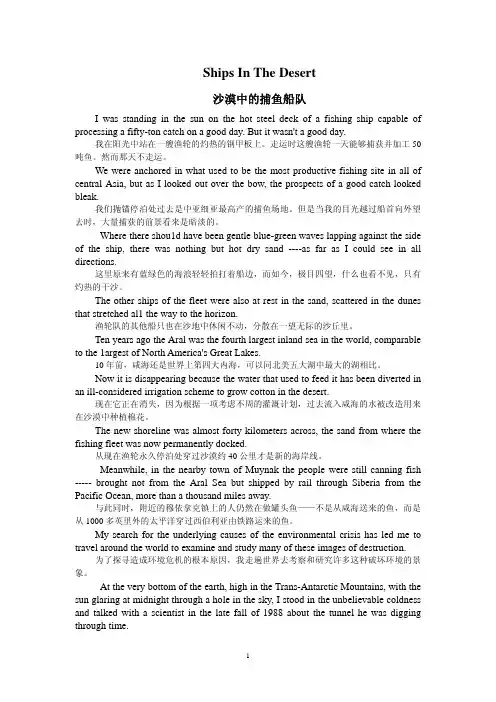
Ships In The Desert沙漠中的捕鱼船队I was standing in the sun on the hot steel deck of a fishing ship capable of processing a fifty-ton catch on a good day. But it wasn't a good day.我在阳光中站在一艘渔轮的灼热的钢甲板上。
走运时这艘渔轮一天能够捕获并加工50吨鱼。
然而那天不走运。
We were anchored in what used to be the most productive fishing site in all of central Asia, but as I looked out over the bow, the prospects of a good catch looked bleak.我们抛锚停泊处过去是中亚细亚最高产的捕鱼场地。
但是当我的目光越过船首向外望去时,大量捕获的前景看来是暗淡的。
Where there shou1d have been gentle blue-green waves lapping against the side of the ship, there was nothing but hot dry sand ----as far as I could see in all directions.这里原来有蓝绿色的海浪轻轻拍打着船边,而如今,极目四望,什么也看不见,只有灼热的干沙。
The other ships of the fleet were also at rest in the sand, scattered in the dunes that stretched al1 the way to the horizon.渔轮队的其他船只也在沙地中休闲不动,分散在一望无际的沙丘里。
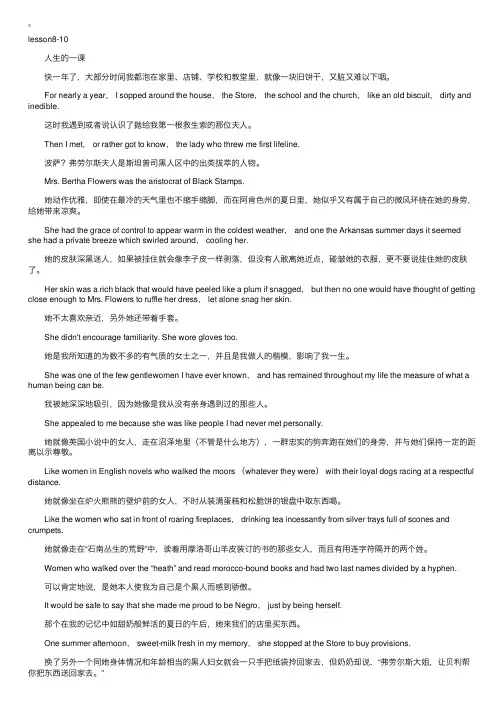
lesson8-10 ⼈⽣的⼀课 快⼀年了,⼤部分时间我都泡在家⾥、店铺、学校和教堂⾥,就像⼀块旧饼⼲,⼜脏⼜难以下咽。
For nearly a year, I sopped around the house, the Store, the school and the church, like an old biscuit, dirty and inedible. 这时我遇到或者说认识了抛给我第⼀根救⽣索的那位夫⼈。
Then I met, or rather got to know, the lady who threw me first lifeline. 波萨?弗劳尔斯夫⼈是斯坦普司⿊⼈区中的出类拔萃的⼈物。
Mrs. Bertha Flowers was the aristocrat of Black Stamps. 她动作优雅,即使在最冷的天⽓⾥也不缩⼿缩脚,⽽在阿肯⾊州的夏⽇⾥,她似乎⼜有属于⾃⼰的微风环绕在她的⾝旁,给她带来凉爽。
She had the grace of control to appear warm in the coldest weather, and one the Arkansas summer days it seemed she had a private breeze which swirled around, cooling her. 她的⽪肤深⿊迷⼈,如果被挂住就会像李⼦⽪⼀样剥落,但没有⼈敢离她近点,碰皱她的⾐服,更不要说挂住她的⽪肤了。
Her skin was a rich black that would have peeled like a plum if snagged, but then no one would have thought of getting close enough to Mrs. Flowers to ruffle her dress, let alone snag her skin. 她不太喜欢亲近,另外她还带着⼿套。
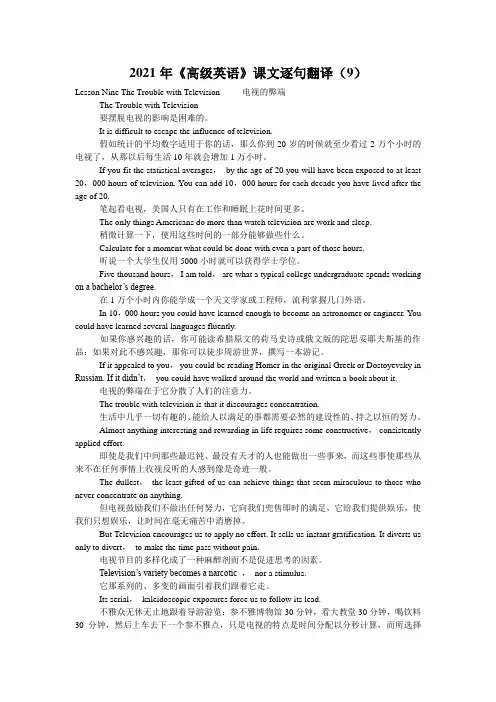
2021年《高级英语》课文逐句翻译(9)Lesson Nine The Trouble with Television 电视的弊端The Trouble with Television要摆脱电视的影响是困难的。
It is difficult to escape the influence of television.假如统计的平均数字适用于你的话,那么你到20岁的时候就至少看过2万个小时的电视了,从那以后每生活10年就会增加1万小时。
If you fit the statistical averages,by the age of 20 you will have been exposed to at least 20,000 hours of television. You can add 10,000 hours for each decade you have lived after the age of 20.笔起看电视,美国人只有在工作和睡眠上花时间更多。
The only things Americans do more than watch television are work and sleep.稍微计算一下,使用这些时间的一部分能够做些什么。
Calculate for a moment what could be done with even a part of those hours.听说一个大学生仅用5000小时就可以获得学士学位。
Five thousand hours,I am told,are what a typical college undergraduate spends working on a bachelor’s degree.在1万个小时内你能学成一个天文学家或工程师,流利掌握几门外语。
In 10,000 hours you could have learned enough to become an astronomer or engineer. You could have learned several languages fluently.如果你感兴趣的话,你可能读希腊原文的荷马史诗或俄文版的陀思妥耶夫斯基的作品;如果对此不感兴趣,那你可以徒步周游世界,撰写一本游记。
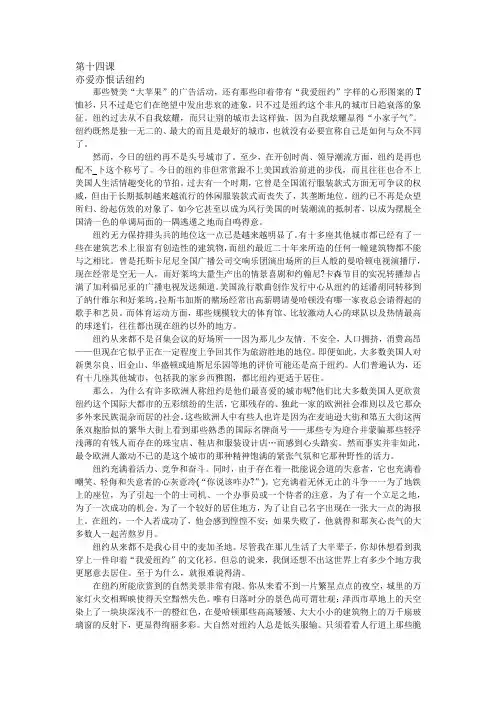
第十四课亦爱亦恨话纽约那些赞美“大苹果”的广告活动,还有那些印着带有“我爱纽约”字样的心形图案的T 恤衫,只不过是它们在绝望中发出悲哀的迹象,只不过是纽约这个非凡的城市日趋衰落的象征。
纽约过去从不自我炫耀,而只让别的城市去这样做,因为自我炫耀显得“小家子气”。
纽约既然是独一无二的、最大的而且是最好的城市,也就没有必要宣称自己是如何与众不同了。
然而,今日的纽约再不是头号城市了。
至少,在开创时尚、领导潮流方面,纽约是再也配不_卜这个称号了。
今日的纽约非但常常跟不上美国政治前进的步伐,而且往往也合不上美国人生活情趣变化的节拍。
过去有一个时期,它曾是全国流行服装款式方面无可争议的权威,但由于长期抵制越来越流行的休闲服装款式而丧失了,其垄断地位。
纽约已不再是众望所归、纷起仿效的对象了,如今它甚至以成为风行美国的时装潮流的抵制者,以成为摆脱全国清一色的单调局面的一隅逃遁之地而自鸣得意。
纽约无力保持排头兵的地位这一点已是越来越明显了。
有十多座其他城市都已经有了一些在建筑艺术上很富有创造性的建筑物,而纽约最近二十年来所造的任何一幢建筑物都不能与之相比。
曾是托斯卡尼尼全国广播公司交响乐团演出场所的巨人般的曼哈顿电视演播厅,现在经常是空无一人,而好莱坞大量生产出的情景喜剧和约翰尼?卡森节目的实况转播却占满了加利福尼亚的广播电视发送频道。
美国流行歌曲创作发行中心从纽约的廷潘胡同转移到了纳什维尔和好莱坞。
拉斯韦加斯的赌场经常出高薪聘请曼哈顿没有哪一家夜总会请得起的歌手和艺员。
而体育运动方面,那些规模较大的体育馆、比较激动人心的球队以及热情最高的球迷们,往往都出现在纽约以外的地方。
纽约从来都不是召集会议的好场所——因为那儿少友情.不安全,人口拥挤,消费高昂——但现在它似乎正在一定程度上争回其作为旅游胜地的地位。
即便如此,大多数美国人对新奥尔良、旧金山、华盛顿或迪斯尼乐园等地的评价可能还是高于纽约。
人们普遍认为,还有十几座其他城市,包括我的家乡西雅图,都比纽约更适于居住。
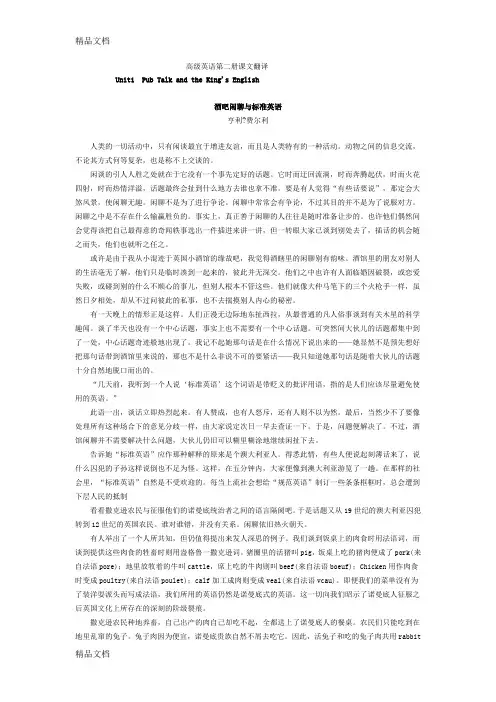
高级英语第二册课文翻译Unit1 Pub Talk and the King's English酒吧闲聊与标准英语亨利?费尔利人类的一切活动中,只有闲谈最宜于增进友谊,而且是人类特有的一种活动。
动物之间的信息交流,不论其方式何等复杂,也是称不上交谈的。
闲谈的引人人胜之处就在于它没有一个事先定好的话题。
它时而迂回流淌,时而奔腾起伏,时而火花四射,时而热情洋溢,话题最终会扯到什么地方去谁也拿不准。
要是有人觉得“有些话要说”,那定会大煞风景,使闲聊无趣。
闲聊不是为了进行争论。
闲聊中常常会有争论,不过其目的并不是为了说服对方。
闲聊之中是不存在什么输赢胜负的。
事实上,真正善于闲聊的人往往是随时准备让步的。
也许他们偶然间会觉得该把自己最得意的奇闻轶事选出一件插进来讲一讲,但一转眼大家已谈到别处去了,插话的机会随之而失,他们也就听之任之。
或许是由于我从小混迹于英国小酒馆的缘故吧,我觉得酒瞎里的闲聊别有韵味。
酒馆里的朋友对别人的生活毫无了解,他们只是临时凑到一起来的,彼此并无深交。
他们之中也许有人面临婚因破裂,或恋爱失败,或碰到别的什么不顺心的事儿,但别人根本不管这些。
他们就像大仲马笔下的三个火枪手一样,虽然日夕相处,却从不过问彼此的私事,也不去揣摸别人内心的秘密。
有一天晚上的情形正是这样。
人们正漫无边际地东扯西拉,从最普通的凡人俗事谈到有关木星的科学趣闻。
谈了半天也没有一个中心话题,事实上也不需要有一个中心话题。
可突然间大伙儿的话题都集中到了一处,中心话题奇迹般地出现了。
我记不起她那句话是在什么情况下说出来的——她显然不是预先想好把那句话带到酒馆里来说的,那也不是什么非说不可的要紧话——我只知道她那句话是随着大伙儿的话题十分自然地脱口而出的。
“几天前,我听到一个人说‘标准英语’这个词语是带贬义的批评用语,指的是人们应该尽量避免使用的英语。
”此语一出,谈话立即热烈起来。
有人赞成,也有人怒斥,还有人则不以为然。
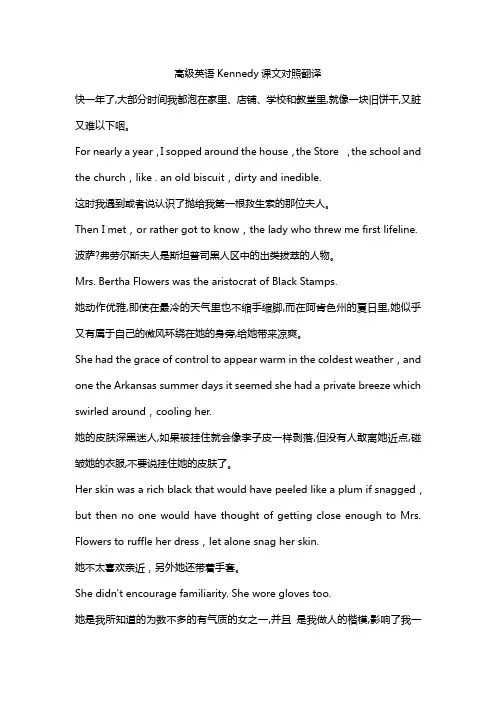
高级英语Kennedy课文对照翻译快一年了,大部分时间我都泡在家里、店铺、学校和教堂里,就像一块旧饼干,又脏又难以下咽。
For nearly a year,I sopped around the house,the Store ,the school and the church,like . an old biscuit,dirty and inedible.这时我遇到或者说认识了抛给我第一根救生索的那位夫人。
Then I met,or rather got to know,the lady who threw me first lifeline. 波萨?弗劳尔斯夫人是斯坦普司黑人区中的出类拔萃的人物。
Mrs. Bertha Flowers was the aristocrat of Black Stamps.她动作优雅,即使在最冷的天气里也不缩手缩脚,而在阿肯色州的夏日里,她似乎又有属于自己的微风环绕在她的身旁,给她带来凉爽。
She had the grace of control to appear warm in the coldest weather,and one the Arkansas summer days it seemed she had a private breeze which swirled around,cooling her.她的皮肤深黑迷人,如果被挂住就会像李子皮一样剥落,但没有人敢离她近点,碰皱她的衣服,不要说挂住她的皮肤了。
Her skin was a rich black that would have peeled like a plum if snagged,but then no one would have thought of getting close enough to Mrs. Flowers to ruffle her dress,let alone snag her skin.她不太喜欢亲近,另外她还带着手套。
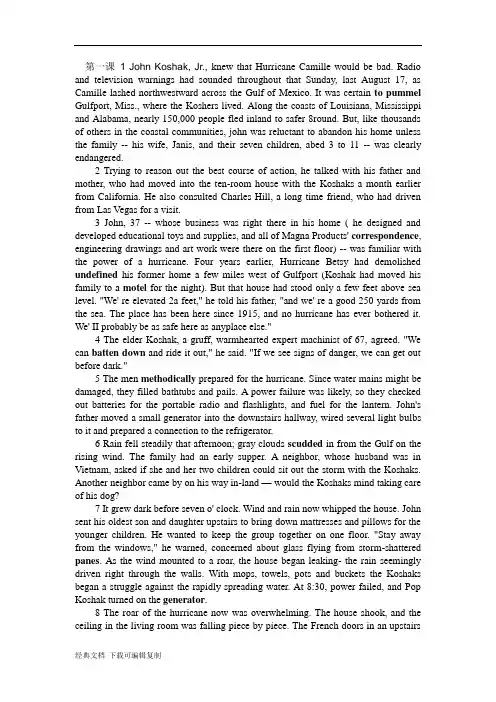
第一课 1 John Koshak, Jr.,knew that Hurricane Camille would be bad. Radio and television warnings had sounded throughout that Sunday, last August 17, as Camille lashed northwestward across the Gulf of Mexico. It was certain to pummel Gulfport, Miss., where the Koshers lived. Along the coasts of Louisiana, Mississippi and Alabama, nearly 150,000 people fled inland to safer 8round. But, like thousands of others in the coastal communities, john was reluctant to abandon his home unless the family -- his wife, Janis, and their seven children, abed 3 to 11 -- was clearly endangered.2 Trying to reason out the best course of action, he talked with his father and mother, who had moved into the ten-room house with the Koshaks a month earlier from California. He also consulted Charles Hill, a long time friend, who had driven from Las Vegas for a visit.3 John, 37 -- whose business was right there in his home ( he designed and developed educational toys and supplies, and all of Magna Products' correspondence, engineering drawings and art work were there on the first floor) -- was familiar with the power of a hurricane. Four years earlier, Hurricane Betsy had demolished undefined his former home a few miles west of Gulfport (Koshak had moved his family to a motel for the night). But that house had stood only a few feet above sea level. "We' re elevated 2a feet," he told his father, "and we' re a good 250 yards from the sea. The place has been here since 1915, and no hurricane has ever bothered it. We' II probably be as safe here as anyplace else."4 The elder Koshak, a gruff, warmhearted expert machinist of 67, agreed. "We can batten down and ride it out," he said. "If we see signs of danger, we can get out before dark."5 The men methodically prepared for the hurricane. Since water mains might be damaged, they filled bathtubs and pails. A power failure was likely, so they checked out batteries for the portable radio and flashlights, and fuel for the lantern. John's father moved a small generator into the downstairs hallway, wired several light bulbs to it and prepared a connection to the refrigerator.6 Rain fell steadily that afternoon; gray clouds scudded in from the Gulf on the rising wind. The family had an early supper. A neighbor, whose husband was in Vietnam, asked if she and her two children could sit out the storm with the Koshaks. Another neighbor came by on his way in-land — would the Koshaks mind taking care of his dog?7 It grew dark before seven o' clock. Wind and rain now whipped the house. John sent his oldest son and daughter upstairs to bring down mattresses and pillows for the younger children. He wanted to keep the group together on one floor. "Stay away from the windows," he warned, concerned about glass flying from storm-shattered panes. As the wind mounted to a roar, the house began leaking- the rain seemingly driven right through the walls. With mops, towels, pots and buckets the Koshaks began a struggle against the rapidly spreading water. At 8:30, power failed, and Pop Koshak turned on the generator.8 The roar of the hurricane now was overwhelming. The house shook, and the ceiling in the living room was falling piece by piece. The French doors in an upstairsroom blew in with an explosive sound, and the group heard gun- like reports as other upstairs windows disintegrated. Water rose above their ankles.9 Then the front door started to break away from its frame. John and Charlie put their shoulders against it, but a blast of water hit the house, flinging open the door and shoving them down the hall. The generator was doused, and the lights went out. Charlie licked his lips and shouted to John. "I think we' re in real trouble. That water tasted salty." The sea had reached the house, and the water was rising by the minute!10 "Everybody out the back door to the oars!" John yelled. "We' II pass the children along between us. Count them! Nine!"11 The children went from adult to adult like buckets in a fire brigade. But the cars wouldn't start; the electrical systems had been killed by water. The wind was too Strong and the water too deep to flee on foot. "Back to the house!" john yelled. "Count the children! Count nine!"12 As they scrambled back, john ordered, "Every-body on the stairs!" Frightened, breathless and wet, the group settled on the stairs, which were protected by two interior walls. The children put the oat, Spooky, and a box with her four kittens on the landing. She peered nervously at her litter. The neighbor's dog curled up and went to sleep.13 The wind sounded like the roar of a train passing a few yards away. The house shuddered and shifted on its foundations. Water inched its way up the steps as first- floor outside walls collapsed. No one spoke. Everyone knew there was no escape; they would live or die in the house.14 Charlie Hill had more or less taken responsibility for the neighbor and her two children. The mother was on the verge of panic. She clutched his arm and kept repeating, "I can't swim, I can't swim."15 "You won't have to," he told her, with outward calm. "It's bound to end soon."16 Grandmother Koshak reached an arm around her husband's shoulder and put her mouth close to his ear. "Pop," she said, "I love you." He turned his head and answered, "I love you" -- and his voice lacked its usual gruffness.17 John watched the water lap at the steps, and felt a crushing guilt. He had underestimated the ferocity of Camille. He had assumed that what had never happened could not happen. He held his head between his hands, and silently prayed: "Get us through this mess, will You?"18 A moment later, the hurricane, in one mighty swipe, lifted the entire roof off the house and skimmed it 40 feet through the air. The bottom steps of the staircase broke apart. One wall began crumbling on the marooned group.19 Dr. Robert H. Simpson, director of the National Hurricane Center in Miami, Fla., graded Hurricane Camille as "the greatest recorded storm ever to hit a populated area in the Western Hemisphere." in its concentrated breadth of some 70 miles it shot out winds of nearly 200 m.p.h. and raised tides as high as 30 feet. Along the Gulf Coast it devastated everything in its swath: 19,467 homes and 709 small businesses were demolished or severely damaged. it seized a 600, 000-gallon Gulfport oil tank and dumped it 3 ~ miles away. It tore three large cargo ships from their moorings and beached them. Telephone poles and 20-inch-thick pines cracked like guns as thewinds snapped them.20 To the west of Gulfport, the town of Pass Christian was virtually wiped out. Several vacationers at the luxurious Richelieu Apartments there held a hurricane party to watch the storm from their spectacular vantage point. Richelieu Apartments were smashed apart as if by a gigantic fist, and 26 people perished.21 Seconds after the roof blew off the Koshak house, john yelled, "Up the stairs -- into our bedroom! Count the kids." The children huddled in the slashing rain within the circle of adults. Grandmother Koshak implored, "Children, let's sing!" The children were too frightened to respond. She carried on alone for a few bars; then her voice trailed away.22 Debris flew as the living-room fireplace and its chimney collapsed. With two walls in their bedroom sanctuary beginning to disintegrate, John ordered, "Into the television room!" This was the room farthest from the direction of the storm.23 For an instant, John put his arm around his wife. Janis understood. Shivering from the wind and rain and fear, clutching two children to her, she thought, Dear Lord, give me the strength to endure what I have to. She felt anger against the hurricane. We won't let it win.24 Pop Koshak raged silently, frustrated at not being able to do anything to fight Camille. Without reason, he dragged a cedar chest and a double mattress from a bed-room into the TV room. At that moment, the wind tore out one wall and extinguished the lantern. A second wall moved, wavered, Charlie Hill tried to support it, but it toppled on him, injuring his back. The house, shuddering and rocking, had moved 25 feet from its foundations. The world seemed to be breaking apart.25 "Let's get that mattress up!" John shouted to his father. "Make it a lean-to against the wind. Get the kids under it. We can prop it up with our heads and shoulders!"26 The larger children sprawled on the floor, with the smaller ones in a layer on top of them, and the adults bent over all nine. The floor tilted. The box containing the litter of kittens slid off a shelf and vanished in the wind. Spooky flew off the top of a sliding bookcase and also disappeared. The dog cowered with eyes closed. A third wall gave way. Water lapped across the slanting floor. John grabbed a door which was still hinged to one closet wall. "If the floor goes," he yelled at his father, "let's get the kids on this."27 In that moment, the wind slightly diminished, and the water stopped rising. Then the water began receding. The main thrust of Camille had passed. The Koshaks and their friends had survived.28 With the dawn, Gulfport people started coming back to their homes. They saw human bodies -- more than 130 men, women and children died along the Mississippi coast- and parts of the beach and highway were strewn with dead dogs, cats, cattle. Strips of clothing festooned the standing trees, and blown down power lines coiled like black spaghetti over the roads.29 None of the returnees moved quickly or spoke loudly; they stood shocked, trying to absorb the shattering scenes before their eyes. "What do we dot" they asked. "Where do we go?"30 By this time, organizations within the area and, in effect, the entire population of the United States had come to the aid of the devastated coast. Before dawn, the Mississippi National Guard and civil-defense units were moving in to handle traffic, guard property, set up communications centers, help clear the debris and take the homeless by truck and bus to refugee centers. By 10 a.m., the Salvation Army's canteen trucks and Red Cross volunteers and staffers were going wherever possible to distribute hot drinks, food, clothing and bedding.31 From hundreds of towns and cities across the country came several million dollars in donations; household and medical supplies streamed in by plane, train, truck and car. The federal government shipped 4,400,000 pounds of food, moved in mobile homes, set up portable classrooms, opened offices to provide low-interest, long-term business loans.32 Camille, meanwhile, had raked its way northward across Mississippi, dropping more than 28 inches of rain into West Virginia and southern Virginia, causing rampaging floods, huge mountain slides and 111 additional deaths before breaking up over the Atlantic Ocean.33 Like many other Gulfport families, the Koshaks quickly began reorganizing their lives, John divided his family in the homes of two friends. The neighbor with her two children went to a refugee center. Charlie Hill found a room for rent. By Tuesday, Charlie's back had improved, and he pitched in with Seabees in the worst volunteer work of all--searching for bodies. Three days after the storm, he decided not to return to Las Vegas, but to "remain in Gulfport and help rebuild the community."34 Near the end of the first week, a friend offered the Koshaks his apartment, and the family was reunited. The children appeared to suffer no psychological damage from their experience; they were still awed by the incomprehensible power of the hurricane, but enjoyed describing what they had seen and heard on that frightful night, Janis had just one delayed reaction. A few nights after the hurricane, she awoke suddenly at 2 a.m. She quietly got up and went outside. Looking up at the sky and, without knowing she was going to do it, she began to cry softly.35 Meanwhile, John, Pop and Charlie were picking through the wreckage of the home. It could have been depressing, but it wasn't: each salvaged item represented a little victory over the wrath of the storm. The dog and cat suddenly appeared at the scene, alive and hungry.36 But the blues did occasionally afflict all the adults. Once, in a low mood, John said to his parents, "I wanted you here so that we would all be together, so you could enjoy the children, and look what happened."37 His father, who had made up his mind to start a welding shop when living was normal again, said, "Let's not cry about what's gone. We' II just start all over."38 "You're great," John said. "And this town has a lot of great people in it. It' s going to be better here than it ever was before."39 Later, Grandmother Koshak reflected: "We lost practically all our possessions, but the family came through it. When I think of that, I realize we lost nothing important."第二课1 As the corpse went past the flies left the restaurant table in a cloud and rushed after it, but they came back a few minutes later.2 The little crowd of mourners -- all men and boys, no women--threaded their way across the market place between the piles of pomegranates and the taxis and the camels, walling a short chant over and over again. What really appeals to the flies is that the corpses here are never put into coffins, they are merely wrapped in a piece of rag and carried on a rough wooden bier on the shoulders of four friends. When the friends get to the burying-ground they hack an oblong hole a foot or two deep, dump the body in it and fling over it a little of the dried-up, lumpy earth, which is like broken brick. No gravestone, no name, no identifying mark of any kind. The burying-ground is merely a huge waste of hummocky earth, like a derelict building-lot. After a month or two no one can even be certain where his own relatives are buried.3 When you walk through a town like this -- two hundred thousand inhabitants of whom at least twenty thousand own literally nothing except the rags they stand up in-- when you see how the people live, and still more how easily they die, it is always difficult to believe that you are walking among human beings. All colonial empires are in reality founded upon this fact. The people have brown faces--besides, there are so many of them! Are they really the same flesh as your self? Do they even have names? Or are they merely a kind of undifferentiated brown stuff, about as individual as bees or coral insects? They rise out of the earth,they sweat and starve for a few years, and then they sink back into the nameless mounds of the graveyard and nobody notices that they are gone. And even the graves themselves soon fade back into the soil. Sometimes, out for a walk as you break your way through the prickly pear, you notice that it is rather bumpy underfoot, and only a certain regularity in the bumps tells you that you are walking over skeletons.4 I was feeding one of the gazelles in the public gardens.5 Gazelles are almost the only animals that look good to eat when they are still alive, in fact, one can hardly look at their hindquarters without thinking of a mint sauce. The gazelle I was feeding seemed to know that this thought was in my mind, for though it took the piece of bread I was holding out it obviously did not like me. It nibbled nibbled rapidly at the bread, then lowered its head and tried to butt me, then took another nibble and then butted again. Probably its idea was that if it could drive me away the bread would somehow remain hanging in mid-air.6 An Arab navvy working on the path nearby lowered his heavy hoe and sidled slowly towards us. He looked from the gazelle to the bread and from the bread to the gazelle, with a sort of quiet amazement, as though he had never seen anything quite like this before. Finally he said shyly in French: "1 could eat some of that bread."7 I tore off a piece and he stowed it gratefully in some secret place under his rags. This man is an employee of the municipality.8 When you go through the Jewish Quarters you gather some idea of what the medieval ghettoes were probably like. Under their Moorish Moorishrulers the Jewswere only allowed to own land in certain restricted areas, and after centuries of this kind of treatment they have ceased to bother about overcrowding. Many of the streets are a good deal less than six feet wide, the houses are completely windowless, and sore-eyed children cluster everywhere in unbelievable numbers, like clouds of flies. Down the centre of the street there is generally running a little river of urine.9 In the bazaar huge families of Jews, all dressed in the long black robe and little black skull-cap, are working in dark fly-infested booths that look like caves. A carpenter sits crosslegged at a prehistoric lathe, turning chairlegs at lightning speed. He works the lathe with a bow in his right hand and guides the chisel with his left foot, and thanks to a lifetime of sitting in this position his left leg is warped out of shape. At his side his grandson, aged six, is already starting on the simpler parts of the job.10 I was just passing the coppersmiths' booths when somebody noticed that I was lighting a cigarette. Instantly, from the dark holes all round, there was a frenzied rush of Jews, many of them old grandfathers with flowing grey beards, all clamouring for a cigarette. Even a blind man somewhere at the back of one of the booths heard a rumour of cigarettes and came crawling out, groping in the air with his hand. In about a minute I had used up the whole packet. None of these people, I suppose, works less than twelve hours a day, and every one of them looks on a cigarette as a more or less impossible luxury.11 As the Jews live in self-contained communities they follow the same trades as the Arabs, except for agriculture. Fruitsellers, potters, silversmiths, blacksmiths, butchers, leather-workers, tailors, water-carriers, beggars, porters -- whichever way you look you see nothing but Jews. As a matter of fact there are thirteen thousand of them, all living in the space of a few acres. A good job Hitlet wasn't here. Perhaps he was on his way, however. You hear the usual dark rumours about Jews, not only from the Arabs but from the poorer Europeans.12 "Yes vieux mon vieux, they took my job away from me and gave it to a Jew. The Jews! They' re the real rulers of this country, you know. They’ve got all the money. They control the banks, finance -- everything."13 "But", I said, "isn't it a fact that the average Jew is a labourer working for about a penny an hour?"14 "Ah, that's only for show! They' re all money lenders really. They' re cunning, the Jews."15 In just the same way, a couple of hundred years ago, poor old women used to be burned for witchcraft when they could not even work enough magic to get themselves a square meal. square meal16 All people who work with their hands are partly invisible, and the more important the work they do, the less visible they are. Still, a white skin is always fairly conspicuous. In northern Europe, when you see a labourer ploughing a field, you probably give him a second glance. In a hot country, anywhere south of Gibraltar or east of Suez, the chances are that you don't even see him. I have noticed this again and again. In a tropical landscape one's eye takes in everything except the human beings. It takes in the dried-up soil, the prickly pear, the palm tree and the distant mountain, but it always misses the peasant hoeing at his patch. He is the same colour as the earth,and a great deal less interesting to look at.17 It is only because of this that the starved countries of Asia and Africa are accepted as tourist resorts. No one would think of running cheap trips to the Distressed Areas. But where the human beings have brown skins their poverty is simply not noticed. What does Morocco mean to a Frenchman? An orange grove or a job in Government service. Or to an Englishman? Camels, castles, palm trees, Foreign Legionnaires, brass trays, and bandits. One could probably live there for years without noticing that for nine-tenths of the people the reality of life is an endless back-breaking struggle to wring a little food out of an eroded soil.18 Most of Morocco is so desolate that no wild animal bigger than a hare can live on it. Huge areas which were once covered with forest have turned into a treeless waste where the soil is exactly like broken-up brick. Nevertheless a good deal of it is cultivated, with frightful labour. Everything is done by hand. Long lines of women, bent double like inverted capital Ls, work their way slowly across the fields, tearing up the prickly weeds with their hands, and the peasant gathering lucerne for fodder pulls it up stalk by stalk instead of reaping it, thus saving an inch or two on each stalk. The plough is a wretched wooden thing, so frail that one can easily carry it on one's shoulder, and fitted underneath with a rough iron spike which stirs the soil to a depth of about four inches. This is as much as the strength of the animals is equal to. It is usual to plough with a cow and a donkey yoked together. Two donkeys would not be quite strong enough, but on the other hand two cows would cost a little more to feed. The peasants possess no narrows, they merely plough the soil several times over in different directions, finally leaving it in rough furrows, after which the whole field has to be shaped with hoes into small oblong patches to conserve water. Except for a day or two after the rare rainstorms there is never enough water. A long the edges of the fields channels are hacked out to a depth of thirty or forty feet to get at the tiny trickles which run through the subsoil.19 Every afternoon a file of very old women passes down the road outside my house, each carrying a load of firewood. All of them are mummified with age and the sun, and all of them are tiny. It seems to be generally the case in primitive communities that the women, when they get beyond a certain age, shrink to the size of children. One day poor creature who could not have been more than four feet tall crept past me under a vast load of wood. I stopped her and put a five-sou sou piece ( a little more than a farthing into her hand. She answered with a shrill wail, almost a scream, which was partly gratitude but mainly surprise. I suppose that from her point of view, by taking any notice of her, I seemed almost to be violating a law of nature. She accept- ed her status as an old woman, that is to say as a beast of burden. When a family is travelling it is quite usual to see a father and a grown-up son riding ahead on donkeys, and an old woman following on foot, carrying the baggage.20 But what is strange about these people is their invisibility. For several weeks, always at about the same time of day, the file of old women had hobbled past the house with their firewood, and though they had registered themselves on my eyeballs I cannot truly say that I had seen them. Firewood was passing -- that was how I saw it. It was only that one day I happened to be walking behind them, and the curiousup-and-down motion of a load of wood drew my attention to the human being beneath it. Then for the first time I noticed the poor old earth-coloured bodies, bodies reduced to bones and leathery skin, bent double under the crushing weight. Yet I suppose I had not been five minutes on Moroccan soil before I noticed the overloading of the donkeys and was infuriated by it. There is no question that the donkeys are damnably treated. The Moroccan donkey is hardly bigger than a St. Bernard dog, it carries a load which in the British Army would be considered too much for a fifteen-hands mule, and very often its packsaddle is not taken off its back for weeks together. But what is peculiarly pitiful is that it is the most willing creature on earth, it follows its master like a dog and does not need either bridle or halter . After a dozen years of devoted work it suddenly drops dead, whereupon its master tips it into the ditch and the village dogs have torn its guts out before it is cold.21 This kind of thing makes one's blood boil, whereas-- on the whole -- the plight of the human beings does not. I am not commenting, merely pointing to a fact. People with brown skins are next door to invisible. Anyone can be sorry for the donkey with its galled back, but it is generally owing to some kind of accident if one even notices the old woman under her load of sticks.22 As the storks flew northward the Negroes were marching southward -- a long, dusty column, infantry , screw-gun batteries, and then more infantry, four or five thousand men in all, winding up the road with a clumping of boots and a clatter of iron wheels.23 They were Senegalese, the blackest Negroes in Africa, so black that sometimes it is difficult to see whereabouts on their necks the hair begins. Their splendid bodies were hidden in reach-me-down khaki uniforms, their feet squashed into boots that looked like blocks of wood, and every tin hat seemed to be a couple of sizes too small. It was very hot and the men had marched a long way. They slumped under the weight of their packs and the curiously sensitive black faces were glistening with sweat.24 As they went past, a tall, very young Negro turned and caught my eye. But the look he gave me was not in the least the kind of look you might expect. Not hostile, not contemptuous, not sullen, not even inquisitive. It was the shy, wide-eyed Negro look, which actually is a look of profound respect. I saw how it was. This wretched boy, who is a French citizen and has therefore been dragged from the forest to scrub floors and catch syphilis in garrison towns, actually has feelings of reverence before a white skin. He has been taught that the white race are his masters, and he still believes it.25 But there is one thought which every white man (and in this connection it doesn't matter twopence if he calls himself a socialist) thinks when he sees a black army marching past. "How much longer can we go on kidding these people? How long before they turn their guns in the other direction?"26 It was curious really. Every white man there had this thought stowed somewhere or other in his mind. I had it, so had the other onlookers, so had the officers on their sweating chargers and the white N. C. Os marching in the ranks. It was a kind of secret which we all knew and were too clever to tell; only the Negroesdidn't know it. And really it was like watching a flock of cattle to see the long column, a mile or two miles of armed men, flowing peacefully up the road, while the great white birds drifted over them in the opposite direction, glittering like scraps of Paper.第三课1 Conversation is the most sociable of all human activities. And it is an activity only of humans. However intricate the ways in which animals communicate with each other, they do not indulge in anything that deserves the name of conversation.2 The charm of conversation is that it does not really start from anywhere, and no one has any idea where it will go as it meanders or leaps and sparkles or just glows. The enemy of good conversation is the person who has "something to say." Conversation is not for making a point. Argument may often be a part of it, but the purpose of the argument is not to convince. There is no winning in conversation. In fact, the best conversationalists are those who are prepared to lose. Suddenly they see the moment for one of their best anecdotes, but in a flash the conversation has moved on and the opportunity is lost. They are ready to let it go.3 Perhaps it is because of my up-bringing in English pubs that I think bar conversation has a charm of its own. Bar friends are not deeply involved in each other's lives. They are companions, not intimates. The fact that their marriages may be on the rooks, or that their love affairs have been broken or even that they got out of bed on the wrong side is simply not a concern. They are like the musketeers of Dumas who, although they lived side by side with each other, did not delve into,each other's lives or the recesses of their thoughts and feelings.4 It was on such an occasion the other evening, as the conversation moved desultorily here and there, from the most commonplace to thoughts of Jupiter, without any focus and with no need for one, that suddenly the alchemy of conversation took place, and all at once there was a focus. I do not remember what made one of our companions say it--she clearly had not come into the bar to say it, it was not something that was pressing on her mind--but her remark fell quite naturally into the talk.5 "Someone told me the Other day that the phrase, 'the King's English' was a term of criticism, that it means language which one should not properly use."6 The glow of the conversation burst into flames. There were affirmations and protests and denials, and of course the promise, made in all such conversation, that we would look it up on the morning. That would settle it; but conversation does not need to be settled; it could still go ignorantly on.7 It was an Australian who had given her such a definition of "the King's English," which produced some rather tart remarks about what one could expect from the descendants of convicts. We had traveled in five minutes to Australia. Of course, there would be resistance to the King's English in such a society. There is always resistance in the lower classes to any attempt by an upper class to lay down rules for "English as it should be spoken."8 Look at the language barrier between the Saxon churls and their Norman conquerors. The conversation had swung from Australian convicts of the 19th century。
lesson3 使⽤暴⼒ Lesson Three The Use of Force 他们是我的新病⼈,我所知道的只有名字,奥尔逊。
They were new patients to me, all I had was the name, Olson. 请您尽快赶来,我⼥⼉病得很重。
“Please come down as soon as you can, my daughter is very sick.” 当我到达时,孩⼦的母亲迎接了我,这是⼀位看上去惊恐不安的妇⼈,⾐着整洁却⼀脸忧伤的神⾊她只是说,这位就是医⽣吗? When I arrived I was met by the mother, a big startled looking woman, very clean and apologetic who merely said,Is this the doctor? 然后带我进了屋。
And let me in. 在后⾯,她⼜说到,请你⼀定要原谅我们,医⽣,我们让她呆在厨房⾥,那⼉暖和,这⾥有时很潮湿。
In the back, she added. You must excuse us, doctor, we have her in the kitchen where it is warm. It is very damp here sometimes. 在厨房的桌⼦旁边,这个孩⼦穿得严严实实的,坐在她⽗亲的腿上。
The child was fully dressed and sitting on here father's lap near the kitchen table. 他⽗亲试图站起来,但我向他⽰意不⽤⿇烦,然后我脱下外套开始检查。
He tried to get up, but I motioned for him not to bother, took off my overcoat and started to look things over. 我能够觉察出他们都很紧张,⽽且⽤怀疑的眼光上下打量着我。
高级英语2课文翻译和单词pub talkLesson 1;Pub Talk and the King’s English 1. intricate [5intrikit] adj. complex; solvable or comprehensible only withpainstaking effort错综复杂的;难懂的,难以解决的:an intricate design难懂的设计2. indulge [in5dQldV] vt. to yield to the desires and whims of,especially to an excessive degree沉迷,放纵,纵情享受:indulge oneself ineating and drinking纵情于吃喝。
与其构成的短语有:indulge in沉溺于;饱享3. meander [mi5AndE] vi. to move aimlessly and idly without fixeddirection漫游,闲逛:We usually meander down to the pub after thedinner.晚饭之后,我们常常漫步去酒吧。
4. conversationalist [7kCnvE5seiFEnElist] n. one given to or skilled atconversation健谈者:He is even-tempered, easy-going and an excellent conversationalist.他处事不惊,待人随和,同时也是个非常健谈的人。
5. anecdote [5AnikdEut] n. a short account of an interesting orhumorous incident轶事,奇闻:He told one or two amusing anecdotesabout his years as a policeman.他讲述了一两桩他当警察时的趣事。
Unit 1 Pub Talk and the King' s English酒肆闲聊与标准英语by:Henry Fairlie1.Conversation is the most sociable of all human activities. And it is an activity only of humans. However intricate the ways in which animals communicate with each other, they do not indulge in anything that deserves the name of conversation.人类的一切活动中,只有闲谈最宜于增进友谊,而且是人类特有的一种活动。
无论动物之间的交流方式有多么复杂,他们都称不上聊天。
2.The charm of conversation is that it does not really start from anywhere, and no one has any idea where it will go as it meanders or leaps and sparkles or just glows. The enemy of good conversation is the person who has "something to say." Conversation is not for making a point. Argument may often be a part of it, but the purpose of the argument is not to convince. There is no winning in conversation. In fact, the best conversationalists are those who are prepared to lose. Suddenly they see the moment for one of their best anecdotes, but in a flash the conversation has moved on and the opportunity is lost. They are ready to let it go.闲谈的引人人胜之处就在于它没有一个事先定好的话题。
《高级英语》课文逐句翻译(11)lesson11谈睡眠Lesson Eleven On Getting off to Sleep人真是充满矛盾啊!毫无疑问,幽默是惟一帮助我们摆脱矛盾的办法,要是没有它,我们就会死于烦恼。
What a bundle of contradictions is a man!Surety,humour is the saving grace of us,for without it we should die of vexation.在我看来,没有什么比睡眠更能说明事物间的矛盾。
With me,nothing illustrates the contrariness of things better than the matter of sleep.比如,我打算写一篇文章,面前放好了笔、墨和几张白纸,准保没写几个字我就会困得要命,无论当时是几点都会那样。
If,for example,my intention is to write an essay,and 1 have before me ink and pens and several sheets of virgin paper,you may depend upon it that before I have gone very far I feel an overpowering desire for sleep,no matter what time of the day it is.我瞪着那似乎在谴责我的白纸,直到眼前一片模糊,声音也难以辨清,只有靠意志力才能勉强坚持。
I stare at the reproachfully blank paper until sights and sounds become dim and confused,and it is only by an effort of will that I can continue at all.即使这时,我也会迷迷糊糊地像在做梦一样继续坚持工作。
黄源深版《高级英语》b o o k L e s s e n课文翻译 Standardization of sany group #QS8QHH-HHGX8Q8-GNHHJ8-HHMHGN#L e s s e n1:Sexism in School学校中的性别歧视如果一个男孩在课堂上喊出来,他会得到老师的关注。
如果一个女孩在课堂上喊出来,她会被告之先举手再发言。
老师表扬男孩比女孩多,会给男孩更多的学业帮助,老师更能接受男孩在课堂讨论中评论。
这只是一些老师怎样偏爱男孩的例子。
通过这样的优势,男生就能增加更好的教育机会,可能得到高工资或者晋级快。
虽然许多人认为课堂歧视在70年代早期就消失了,但它并没有消失。
教育不是一种供人观看的体育运动。
许多研究者,最近的有加州大学洛杉矶分校前教育系系主任John Goodlad,也是“一个被称为学校的地方”的作者,他们表明,当学生参与课堂讨论时,他们对学校持有更积极的态度,这种积极的态度能增进学习。
女生在课堂上比较被动,在高考中比男生得分低,这决不是一种巧合。
大多数老师声称,女生参加课堂讨论和男生一样,也经常会被提问。
但刚刚完成的长达三年的研究发现,不是这样的,男生显然会控制整个课堂氛围。
当我们给老师、行政人员看了课堂讨论视频,问谁说得多时,老师们异口同声说女生说得多。
但事实上,在视频中,男生比女生说得多的比例是3:1。
在我们的研究中,实地研究者对4个州的小学4年级、6年级、初中2年级以及哥伦比亚特区等100多个班级的学生进行了观察。
老师和学生有男的、女的、黑人、白人、来自城市的、郊区的、农村社区的。
一半的课程是语言艺术和英语,这些课程传统上是女生占优势;另一半课程是数学和科学,这些传统上是男生的领域。
我们发现所有的年级、所有的社区、所有的学科中,都是男生控制住了课堂交流,他们比女生参与课堂互动多,随着时间的推移,他们参与的越来越多。
我们的研究否定了传统的假设,女生在阅读课上统治课堂讨论,而男生则是在数学课上。
蓝天blue sky 头痛headache 心形heart-shaped前门front door 信箱mailbox 松针pine needle山脚foot of a mountain 发带hair band 饮用水drinking water钓鱼竿fishing rod 轻如鸿毛as light as a feather 眼见为实Seeing is believing干货dried food 海狗fur seal 农民farmer纸钱joss paper 马屁宣传popularize/publicize绿豆mung bean 酸奶yoghurt 热点 a popular pot鞋展靴筒价廉物美economical and good 酒店hotel、restaurant 行车道个人主义individualism停车道休息室lounge 唯心主义idealism油性皮肤oily skin 食言break a promise 自由主义liberalism拖后腿be a drag on sb 向外看高等学校戴绿帽子make sb cuckold黄色书籍pornography 翻天覆地街上的行人好好先生yes-man头脑一根筋纺织品dry goods 海豹sea dog纸钞,钞票paper money 二百五 a horse’s ass四季豆green bean 变质发酸的牛奶sour milk买二手、廉价货的市场boot fair 制造或贩卖非法商品bootleg售卖酒类的商店wine shop 私人从主干道到车库的道路driveway 林荫大道parkway 公共厕所rest room放水油布oil skin 承认自己说错话eat one’s words愚弄某人pull one’s leg 当心、留神look out美国的中学high school 破产have/wear a green bonnet电话簿yellow book 不遗余力、千方百计to move heaven and earth 无家可归的流浪者street people 假正经的人goody-goodyTo have a one-track mind= to be continuously thinking about one particular thing.(昆虫的)口器mouthpart 小炒home-style dishes大人adult 白酒Chinese liquor红酒wine 宰客swindle money from customers彩票lottery 黑点black dot糖人candy figurine 削笔刀pencil sharpener复习备考to study/prepare for the test 你真是个猪头!You’re a big fool !口琴mouth organ 不重要的人small-fry大人物,要人big man 白葡萄酒white wine烈酒、威士忌red liquor 屠杀顾客slaughter customers彩色的票证colorful ticket 交通事故多发地段black spot毒贩candy man 美工刀pencil knife出考卷to prepare the test 非常固执pigheaded如鱼得水feel just like fish in water临阵磨枪sharpen one’s spear only before going into battle狐假虎威The fox borrows the tiger’s terror猫哭老鼠The cat weeps over the mouse对牛弹琴play the harp to a bull雨后春笋like bamboo shoots after a spring shower一寸光阴一寸金An inch of time is an inch of gold谋事在人,成事在天Man proposes,God disposes胸有成竹have a well-thought-out plan before doing something手忙脚乱in a frantic rush立竿见影get instant results噤若寒蝉keep quiet明火执仗do evil things openly牵肠挂肚be full of anxiety and worry快马加鞭speed up藕断丝连have not cut off relations completely五光十色multicolored归心似箭be very anxious to return home鸡毛蒜皮trifling开门见山come straight to the point狗急跳墙do something desperate黔驴技穷at one’s wits’ end单枪匹马all by oneself生龙活虎bursting with energy顺手牵羊walk off with something守株待兔trust to chance and stroke of luck肉中刺a thorn in the flesh混水摸鱼fish in troubled water趁热打铁Strike while the iron is hot眼见为实Seeing is believing隔墙有耳Walls have ears自投罗网throw oneself into the trap嗤之以鼻turn up one’s nose at一触即发touch and go空中楼阁castles in the air充耳不闻turn a deaf ear to熟能生巧Practice makes perfect事实胜于雄辩Facts speak louder than words笑掉大牙laugh off one’s head乱七八糟at sixes and sevens东张西望look right and left抛砖引玉to throw a sprat to catch a herring缘木求鱼seek a hare in hen’s nest挥金如土to spend money like water胆小如鼠as timid as a hare瓮中之鳖like a rat in a hole无风不起浪There is no smoke without fire挂羊头卖狗肉cry up wine and sell vinegar有志者事竟成Where there is a will there is a way 新官上任三把火new brooms sweep clean偷鸡不成蚀把米go for wool and come back shorn 己所不欲勿施于人Do as you would be done by以眼还眼an eye for an eye君子协定a gentleman’s agreement武装到牙齿armed to the teeth。